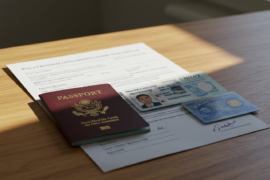This article may contain references to products or services from one or more of our advertisers or partners. We may receive compensation when you click on links to those products or services. Nonetheless, our opinions are our own.
Properly managing personal and official documents is essential for maintaining order, ensuring quick access, and safeguarding critical information. Whether storing legal paperwork, financial records, or medical history, having a structured system minimizes stress and prevents complications. A well-organized approach can help streamline daily life, reduce the risk of misplaced files, and improve overall security.
This comprehensive guide explores practical methods for sorting, storing, and protecting essential documents physically and digitally. By following these strategies, vital records can remain secure, accessible, and up to date.
Classifying Documents for Better Organization
One of the most effective ways to manage documents is to categorize them based on their purpose and importance. Assigning documents to specific groups makes retrieving information easier and ensures that nothing essential is overlooked. Below is a general classification system:
| Category | Examples | Recommended Storage |
|---|---|---|
| Personal Records | Birth certificates, passports, Social Security cards | Fireproof safe or secure filing system |
| Financial Documents | Tax returns, bank statements, investment reports | Lockable cabinet or encrypted digital storage |
| Legal Papers | Wills, property deeds, insurance policies | Safe deposit box or cloud storage with encryption |
| Medical History | Health insurance, prescriptions, medical records | Digital health folder or personal storage file |
| Employment Records | Work contracts, pay stubs, performance evaluations | Organized binder or secure online folder |
For households managing records for multiple individuals, color-coded folders or personalized binders can help separate documents clearly and prevent mix-ups.
Selecting an Effective Storage Solution
Keeping documents safe requires thoughtful storage solutions that prioritize security and accessibility. Different storage methods may be more suitable for different types of documents.
Physical Storage Methods
- Fireproof and Waterproof Safes are ideal for protecting vital documents such as passports, birth certificates, and property deeds from damage or theft.
- Filing Cabinets with Locking Mechanisms – Beneficial for organizing many financial or legal documents while maintaining controlled access.
- Labeled Binders and Folders – A practical way to keep frequently accessed records readily available without clutter.
Digital Storage Options
- External Hard Drives – Provides an offline backup, reducing risks associated with cyber threats.
- Cloud-Based Services – Platforms like Google Drive, Dropbox, and OneDrive offer secure remote access and automatic backups.
- Encrypted USB Drives – A secure option for storing sensitive files that should remain protected from unauthorized access.
A combination of physical and digital storage is highly recommended to ensure maximum protection.
Steps to Securely Digitize Documents:
Digitizing vital records is an excellent way to prevent loss due to natural disasters, theft, or simple misplacement. Keeping an organized digital archive can retrieve and store documents efficiently and securely.
- Scan Important Files- To create clear digital copies, use a high-quality scanner or a scanning application such as Adobe Scan or CamScanner.
- Organize Documents in Folders – Store files in clearly labeled directories, such as “Tax Records,” “Property Documents,” or “Insurance Policies.”
- Encrypt Sensitive Information—Using encryption tools like BitLocker (Windows) or FileVault (Mac) to protect confidential documents.
- Set Up Automated Backups – Use external hard drives and cloud storage with automatic synchronization to ensure redundancy.
Regularly reviewing and updating digital files prevents outdated or incorrect information from accumulating and helps maintain an efficient filing system.
Routine Maintenance for Document Organization
Even the most well-organized document system requires periodic review and updates. Establishing a simple maintenance schedule ensures that records remain relevant and current.
- Every Six Months, Sort through files and remove outdated or unnecessary documents.
- Annually: Review and update key financial, legal, and medical records to reflect current information.
- As Needed: Replace damaged physical copies and confirm that all digital backups function correctly.
Keeping a log of stored documents can also help you track where files are located and determine when updates are required.
Proper Disposal of Outdated Documents
Secure disposal methods should always be used to protect personal information when discarding outdated or unnecessary records. Carelessly disposing of sensitive documents may lead to identity theft or unauthorized access.
Recommended Disposal Methods:
- Paper Shredding: A cross-cut shredder ensures that personal and financial records cannot be reconstructed.
- Professional Shredding Services: Document destruction services provide secure disposal for large volumes of sensitive paperwork.
- Secure Digital File Deletion: Use specialized software such as CCleaner to erase files from electronic devices permanently.
Frequently Asked Questions
How long should financial records be kept?
The Internal Revenue Service (IRS) recommends that tax documents be stored for at least seven years. Depending on personal financial tracking needs, bank statements and receipts can typically be kept for one to three years.
What is the safest way to store passwords for digital documents?
A password manager like LastPass or Bitwarden provides secure storage and easy access. For those who prefer a physical record, passwords should be written down in a notebook in a safe location.
Is it necessary to keep both digital and physical copies of documents?
For essential records such as wills, property deeds, and identification documents, maintaining both formats ensures that they are accessible even in unexpected situations.
Final Considerations
Organizing important documents with a well-planned system reduces stress, increases efficiency, and enhances security. By categorizing records, choosing suitable storage solutions, and maintaining regular updates, essential documents remain protected and easily accessible. Implementing these best practices ensures that personal, financial, and legal records are always available when needed.

Reviewed and edited by Albert Fang.
See a typo or want to suggest an edit/revision to the content? Use the comment form below for feedback.
At FangWallet, we value editorial integrity and open collaboration in curating quality content for readers to enjoy. Much appreciated for the assist.
Did you like our article and find it insightful? We encourage sharing the article link with family and friends to benefit as well - better yet, sharing on social media. Thank you for the support! 🍉
Article Title: Effective Strategies for Organizing Your Most Important Documents
https://fangwallet.com/2025/03/26/organize-important-documents/The FangWallet Promise
FangWallet is an editorially independent resource - founded on breaking down challenging financial concepts for anyone to understand since 2014. While we adhere to editorial integrity, note that this post may contain references to products from our partners.
The FangWallet promise is always to have your best interest in mind and be transparent and honest about the financial picture.
Become an Insider
Editorial Disclaimer: The editorial content on this page is not provided by any of the companies mentioned. The opinions expressed here are the author's alone.
The content of this website is for informational purposes only and does not represent investment advice, or an offer or solicitation to buy or sell any security, investment, or product. Investors are encouraged to do their own due diligence, and, if necessary, consult professional advising before making any investment decisions. Investing involves a high degree of risk, and financial losses may occur including the potential loss of principal.
Source Citation References:
+ Inspo
There are no additional citations or references to note for this article at this time.











































